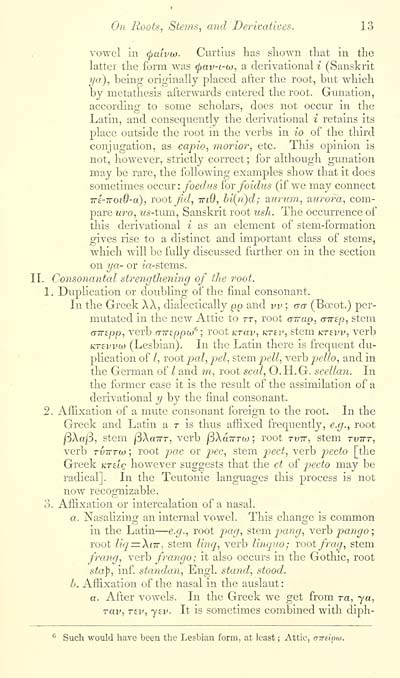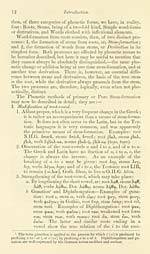Blair Collection > Celtic studies
(43)
Download files
Complete book:
Individual page:
Thumbnail gallery: Grid view | List view

On Roots, Stems, and Derivatives. 13
vowel in (paivu). Curtius has sliowii that in the
latter the form was tpavi-oj, a derivational i (Sanskrit
ya), being originally placed after the root, but which
by metathesis afterwards entered the root. Gnnation,
according to some scholars, does not occur in the
Latin, and consequently the derivational i retains its
place outside the root in the verbs in io of the third
conjugation, as capio, morior, etc. This opinion is
not, however, strictly correct ; for although gunation
may be rare, the following examples show that it does
sometimes occwr: feed us for foidus (if we may connect
Tri-TToiO-a), root Jid, iriO, bi{n)d; aurum, aurora, com-
pare uro, t/s-tum, Sanskrit root ush. The occurrence of
this derivational i as an element of stem-formation
gives rise to a distinct and important class of stems,
which will be fully discussed farther on in the section
on ya- or m-stems.
11. Consonantal strengthening of the root.
1 . Duplication or doubling of the final consonant.
In the Greek XA, dialcctically pp and vv ; cro- (Boeot.) per-
mutated in the new Attic to tt, root airap, cnrep, stem
airepp, verb (nr^ppo)^ ', root icrav, KTev, stem Knvv, verb
KT£vv(i) (Lesbian). In the Latin there is frequent du-
plication of /, root pa^, jyel, stem j^ell, verb j?ello, and in
the German of I and m, root seal, O.H.G. scellan. In
the former case it is the result of the assimilation of a
derivational y by the final consonant.
2. Affixation of a mute consonant foreign to the root. In the
Greek and Latin a r is thus affixed frequently, e.g., root
j3Aaj3, stem j3Aa7rr, verb /SAaTrrw; root tvtt, stem tvttt,
verb TVTTTU} ; root 2)'^''C oi' pec, stem pect, verb pecto [the
Greek ktilq however suggests that the ct of p>ecto may be
radical]. In the Teutonic languages this process is not
now recognizable.
3. Affixation or intercalation of a nasal.
a. Nasalizing an internal vowel. This change is common
in the Latin — e.g., root p>ag, stem p>ang, verb pango ;
root liq = Xnr., stem linq, verb linquo; root frag, stem
frang, verb frango; it also occurs in the Gothic, root
sta]i, inf standan, Engl, stand, stood.
h. Affixation of the nasal in the auslaut :
a. After vowels. In the Greek we get from ra, ya,
rav, rev, yiv- It is sometimes combined with diph-
•^ Such woiild liaA-e been the Lesbian form, at least ; Attic, (nreipoj.
vowel in (paivu). Curtius has sliowii that in the
latter the form was tpavi-oj, a derivational i (Sanskrit
ya), being originally placed after the root, but which
by metathesis afterwards entered the root. Gnnation,
according to some scholars, does not occur in the
Latin, and consequently the derivational i retains its
place outside the root in the verbs in io of the third
conjugation, as capio, morior, etc. This opinion is
not, however, strictly correct ; for although gunation
may be rare, the following examples show that it does
sometimes occwr: feed us for foidus (if we may connect
Tri-TToiO-a), root Jid, iriO, bi{n)d; aurum, aurora, com-
pare uro, t/s-tum, Sanskrit root ush. The occurrence of
this derivational i as an element of stem-formation
gives rise to a distinct and important class of stems,
which will be fully discussed farther on in the section
on ya- or m-stems.
11. Consonantal strengthening of the root.
1 . Duplication or doubling of the final consonant.
In the Greek XA, dialcctically pp and vv ; cro- (Boeot.) per-
mutated in the new Attic to tt, root airap, cnrep, stem
airepp, verb (nr^ppo)^ ', root icrav, KTev, stem Knvv, verb
KT£vv(i) (Lesbian). In the Latin there is frequent du-
plication of /, root pa^, jyel, stem j^ell, verb j?ello, and in
the German of I and m, root seal, O.H.G. scellan. In
the former case it is the result of the assimilation of a
derivational y by the final consonant.
2. Affixation of a mute consonant foreign to the root. In the
Greek and Latin a r is thus affixed frequently, e.g., root
j3Aaj3, stem j3Aa7rr, verb /SAaTrrw; root tvtt, stem tvttt,
verb TVTTTU} ; root 2)'^''C oi' pec, stem pect, verb pecto [the
Greek ktilq however suggests that the ct of p>ecto may be
radical]. In the Teutonic languages this process is not
now recognizable.
3. Affixation or intercalation of a nasal.
a. Nasalizing an internal vowel. This change is common
in the Latin — e.g., root p>ag, stem p>ang, verb pango ;
root liq = Xnr., stem linq, verb linquo; root frag, stem
frang, verb frango; it also occurs in the Gothic, root
sta]i, inf standan, Engl, stand, stood.
h. Affixation of the nasal in the auslaut :
a. After vowels. In the Greek we get from ra, ya,
rav, rev, yiv- It is sometimes combined with diph-
•^ Such woiild liaA-e been the Lesbian form, at least ; Attic, (nreipoj.
Set display mode to: Large image | Transcription
Images and transcriptions on this page, including medium image downloads, may be used under the Creative Commons Attribution 4.0 International Licence unless otherwise stated. ![]()
| Early Gaelic Book Collections > Blair Collection > Celtic studies > (43) |
|---|
| Permanent URL | https://digital.nls.uk/75771655 |
|---|
| Description | A selection of books from a collection of more than 500 titles, mostly on religious and literary topics. Also includes some material dealing with other Celtic languages and societies. Collection created towards the end of the 19th century by Lady Evelyn Stewart Murray. |
|---|
| Description | Selected items from five 'Special and Named Printed Collections'. Includes books in Gaelic and other Celtic languages, works about the Gaels, their languages, literature, culture and history. |
|---|

